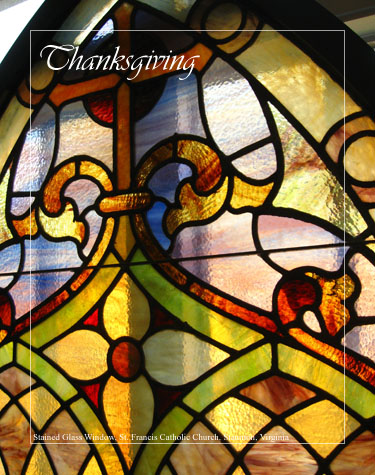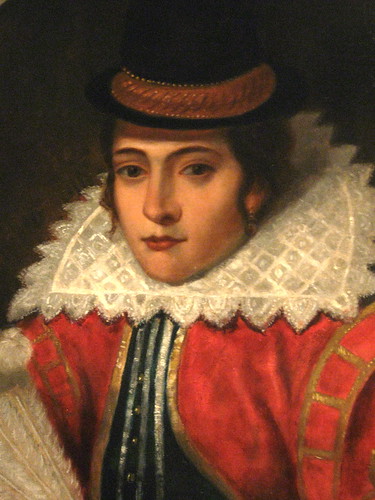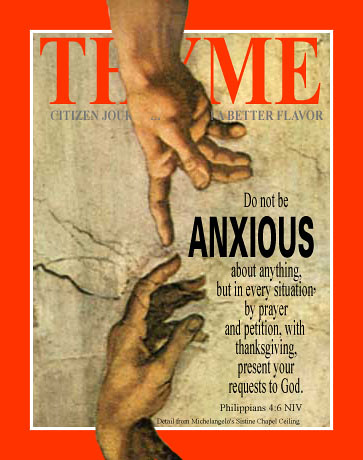
Volume VIII, Issue XXII
Thanksgiving is Good for You
Enter his gates with thanksgiving and his courts with praise; give thanks to him and praise his name. For the LORD is good and his love endures forever; his faithfulness continues through all generations.” -- Psalm 100:4-5 NIV
The 'other' Weekly News Magazine [click to read] once featured the story: "Why ANXIETY is Good for You." We at THYME see this one a bit differently. In the Bible, Philippians 4:6 exhorts us NOT to be anxious. Rather we are to view our needs in light of our relationship to a loving G-d. Indeed, our requests are presented in light of the gratitude we feel as we consider the goodness and provision to be found in the Divine.
Fitting thoughts as we celebrate the feast of Thanksgiving. These are indeed anxious times, and it is easy to become overwhelmed by the general angst of the period we live in. History tells us of Divine promise and fulfillment. The Patriarchs piled up stones to remind them of G-d's faithfulness in the past and to keep them faithful as they waited to see His faithfulness in their present lives.
And it shall be on the day when ye shall pass over Jordan unto the land which the LORD thy God giveth thee, that thou shalt set thee up great stones, and plaister them with plaister: And thou shalt write upon them all the words of this law, when thou art passed over, that thou mayest go in unto the land which the LORD thy God giveth thee, a land that floweth with milk and honey; as the LORD God of thy fathers hath promised thee." -- Deuteronomy 27:2-3
Indeed, one must recount the stories of how G-d met needs in times past. One must also tell of the promises of G-d. Faith needs fuel, and Gratitude is the substance that makes our faith burn bright, even in the darkest of times.
Standing on the Promises [1.]
Standing on the promises of Christ my King,
through eternal ages let his praises ring;
glory in the highest, I will shout and sing,
standing on the promises of G-d.
Refrain:
Standing, standing,
standing on the promises of Christ my Savior;
standing, standing,
I'm standing on the promises of G-d.
Standing on the promises that cannot fail,
when the howling storms of doubt and fear assail,
by the living Word of G-d I shall prevail,
standing on the promises of G-d.
(Refrain)
3. Standing on the promises of Christ the Lord,
bound to him eternally by love's strong cord,
overcoming daily with the Spirit's sword,
standing on the promises of G-d.
(Refrain)
4. Standing on the promises I cannot fall,
listening every moment to the Spirit's call,
resting in my Savior as my all in all,
standing on the promises of G-d.
(Refrain)
The staff of THYME wish you a most blessed Thanksgiving!
The 'Common Course and Condition'
America's First Experiment with Socialism
When the Pilgrims first set up their economic system in Plymouth they opted for a system where all the results of their labor were held in common. All of the colonists then drew from the common store what they lived on. The Common Course and Condition, as this system was called, resulted in some bad feelings on the part of those who produced effectively and some lack of initiative on the part of those who were happy to have the food without the work.
The system produced constant shortages and a man who rose early and worked diligently came quite naturally to resent his neighbor who slept in and contributed less effort. Friction was high among the colonists and in 1623 Governor William Bradford declared the common course a failure.
The colonists were next assigned plots by families. Larger families were given larger plots. Everyone was responsible for the production of his own land and growing food for his own family. The results were notable. Far more crops were planted and tended. There was plenty instead of shortage and all in response to this new sense of ownership.
Church Found where
Pocohantas was Married

Her eyes meet yours as you enter the Virginia Executive Mansion. A young girl from days long ago, yet her presence in the foyer immediately captured my attention. There are two portraits of Pocahontas in the room, one in English clothing (below) and the more familiar rendering seen above.

Pocahontas's formal names were Matoaka (or Matoika) and Amonute. Pocahontas is a childhood name that perhaps referred to her playful nature. After her marriage to John Rolfe, she was known as Rebecca Rolfe.
Archeologists say that they have Discovered the Church [click to read] where Pocahontas married Jamestown planter John Rolfe.
Harvest Hymn Written
in 1844 by Henry Alford

“Come, Ye Thankful People, Come” is a harvest hymn written in 1844 by Henry Alford. It is often sung to the tune “St. George's Windsor” by George Job Elvey. So I created this in light of Thanksgiving to remind us of what we should really be thankful for. Two of my photos are overlayed with the text of the hymn added." -- Kristina Elaine Riley Photo Graphic by Kristina Elaine Riley
View Larger Image [click to view].









